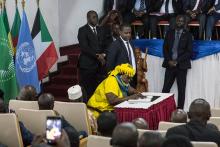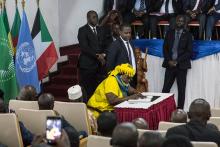As UN Member States and civil society groups prepare to mark the twenty-third anniversary of Security Council resolution 1325 on women, peace, and security, the world is in crisis.
Horrifying conflicts continue to unfold with devastating impacts on civilians in Sudan, Ukraine, Haiti, Kosovo1, the Sahel, Afghanistan, and beyond. These conflicts are now accompanied by the escalating situation in the Middle East, which is testing the limits of the multilateral system.
Expert’s take: What does the Secretary-General’s New Agenda for Peace mean for women?
All these crises are underpinned by destructive, patriarchal militarism. As this year’s Secretary-General’s report on women, peace, and security documents, 2022 marked the eighth consecutive year that global military expenditure increased, reaching a record high of USD 2.2 trillion. That sum could fund the global implementation of all the gender-related sustainable development goals and targets nearly three times over.
Given the current state of the world, it is evident that our current means of preventing and responding to conflict are not working. The Secretary-General’s New Agenda for Peace aims to respond to this challenge and represents a welcome recognition of decades of feminist advocacy to address the root causes of conflict.
The agenda contains twelve actions to address the gamut of peace and security challenges facing the world—from the threat of nuclear weapons and small arms to new challenges related to technology, innovation in warfare, and climate change. Importantly, it recognizes that inequality, injustice, and patriarchy are the root causes of conflict and fragility worldwide, and calls for reduced military expenditure, disarmament, and investment in prevention.
Action 5 in the agenda specifically calls on governments to “transform gendered power dynamics in peace and security” and calls for countries to:
- Introduce concrete measures to secure women’s full equality and meaningful participation at all levels of decision-making.
- Commit to the eradication of all forms of gender-based violence and enact robust and comprehensive legislation concerning gender-based hate speech, impunity for perpetrators, and services and protection to survivors.
- Provide sustained, predictable, and flexible financing for gender equality. Allocate 15 per cent of development assistance to gender equality, and provide a minimum of 1 per cent of assistance directly to women’s organizations, especially grass-roots groups mobilizing for peace.
Women’s participation makes peace processes more durable and women’s peacebuilding efforts are sustainable and cost-effective. Time and again, women leaders and peacebuilders are the only voices calling for peace and political solutions, the very thing that the Secretary-General regularly calls on the entire international system to do.
And yet, in spite of this critical role, funding to women’s organizations in conflict zones is falling, and constitutes just 0.3 per cent of all overseas development aid to fragile settings, according to the Secretary-General’s report.
The New Agenda for Peace also recognizes the link between violence against women, hate speech, and women’s ability to participate in politics. Violent political attacks against women increased 1.5 times between 2020 and 2022, another indication of increased instability around the world, that report said.
Twenty-three years after women’s role in peacebuilding was recognized in the landmark Security Council resolution 1325, Member States and the UN system have the opportunity to come together to implement the New Agenda for Peace.
This will require a fundamental shift in how the UN and Member States go about peacemaking, peacekeeping, and peacebuilding.
More than halfway through the Sustainable Development Goals, no conflict-affected country is on track to achieve the goals relating to hunger, health, or gender equality. With only seven years left to go and ever-worsening and costly effects of the climate crisis, we simply cannot afford the price of war and its long-lasting impacts.
Recognizing, supporting, and investing in women’s leadership for peace is key to reducing those negative trends. The New Agenda for Peace is clear: misogyny, patriarchy, discrimination, and exclusion drive and exacerbate conflict. In the twenty-first century, power structures that perpetuate these toxic values must be dismantled once and for all.

